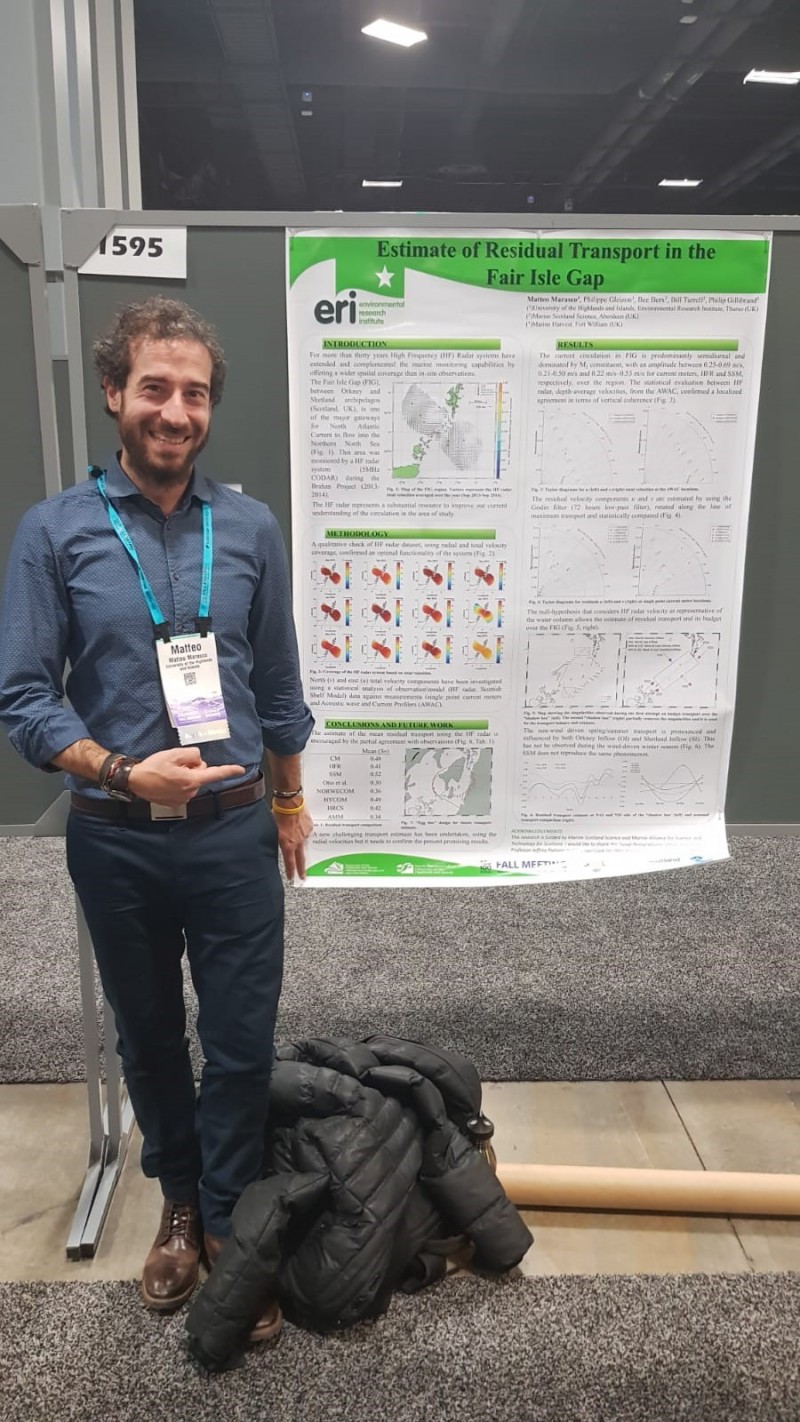AGU Fall Meeting 2018
Matteo Marasco
University of the Higlhands and Islands

This is the second time I have been awarded for the travel Award. I am, again, very grateful to Challenger Society for the great opportunity. The price contributed to finance my attendance to the AGU Fall Meeting 2018 in Washington DC. From 9th to 14th of December, I have been in the most remarkable geophysical conference of the world which counted more than 28000 attendees!
I am undertaking the last year of my PhD in Physical Oceanography and I have spent almost three years of my research on the application of coastal High Frequency (HF) systems. The conference came at a time when I have been approaching the final stages of my studies, demonstrating the HFR use as reliable monitoring instrument over the Scottish Shelf region. In this regard, the conference dedicated a specific session on the HF radar technology (Land-Based Remote Sensing of the Coastal Ocean) where the novel HF radar data processing and system assessment techniques have been introduced. Each poster/presentation covered a broad spectrum of topics related to radio-oceanography and different high frequency and x-band radar technologies. I have been part of the Outstanding Student Presentation Awards (OSPAs) where I gave a few presentations of my poster entitled ‘Residual transport estimate in the FIG’. I was delighted to be in this extraordinary scientist community, where connections, exchange of ideas and cooperation were easy to establish. The conference had systematic breaks in order to have valuable conversations about the interdisciplinary sessions and interesting non-scientific chats.
I had the unique opportunity to talk with some of the best radar experts and scientists overall, sharing with them questions and doubts about my research. I also had the chance to network with PhD students, which are exploring the radar technology from different prospective. Those meetings made a precious contribution to my personal experience. As an early researcher, the experience gained during the AGU Fall Meeting 2018 has been beneficial for the further development of my career as a researcher.
I would like also to thank Environmental Research Institute (ERI), University of the Highlands and Islands (UHI), PRIMaRE for enabling me to attend the AGU Fall Meeting 2018.
Latest News
Royal Society Publishing Photography Competition 2025
Please see a message from the Royal Society below:
We are delighted to announce that the 2025 Competition is now open for entries until 15 August for a chance to win £1000! The competition celebrates the power of photography in conveying the wonder of science happening all around us and photographs can be submitted in the categories of: Astronomy, Behaviour, Earth Science and Climatology, Ecology and Environmental Science, and Microimaging.
The competition is free to enter and open to anyone studying or working in science at graduate level or above. Category winners will receive a one-year membership to the Royal Photographic Society and the overall winner will receive a grand prize of £1,000. Find out more: https://bit.ly/RSPphotocomp
October 2025 MEDIN Workshop: Marine Data Management, Governance and the MEDIN toolset
The Marine Environmental Data and Information Network (MEDIN) are pleased to announce that registration is now open for the next occurrence of our popular free online training workshop: ‘Marine Data Management, Governance and the MEDIN toolset’ on the 13th – 17th October 2025 on OceanTeacher Global Academy.
Marine Data Management, Governance and the MEDIN toolset
The Marine Environmental Data and Information Network (MEDIN) and OceanWise are delighted to invite you to attend our popular free online training workshop: ‘Marine Data Management, Governance and the MEDIN toolset’ on the 19th – 23rd of May 2025.
